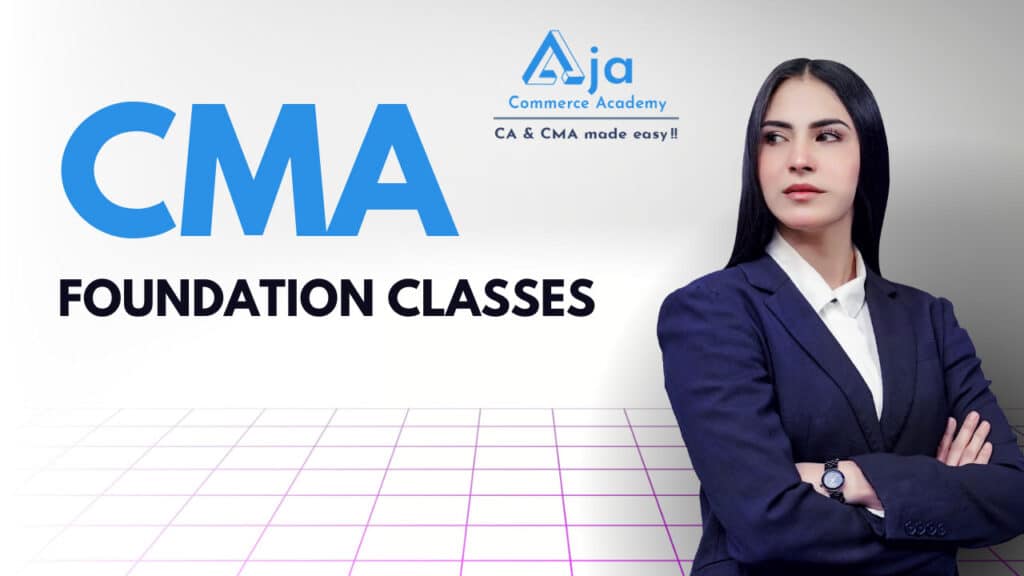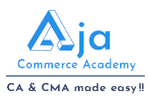
Mastering the CMA Foundation Course
by Aja Commerce Academy
The CMA Foundation course is an entry-level certification course for individuals who aspire to become Certified Management Accountants (CMA). The course provides a comprehensive understanding of the fundamental concepts and principles of management accounting, financial planning, analysis, control and decision-making.
Register Now
Understanding the CMA Foundation Syllabus
- The syllabus of CMA Foundation course is designed to provide a strong foundation in the core concepts of accounting, finance, taxation and business laws. It consists of four papers carrying 100 marks each and are as follows:
- Business Economics and Management – covers the basics of microeconomics and macroeconomics as well as principles of management.
- Financial and Cost Accounting – covers the fundamentals of financial accounting and preparation of financial statements.
- Fundamentals of Business Laws and Communication – covers the basic principles of business laws and ethics.
- Business Mathematics and Statistics – covers the basics of mathematics and statistics as applied to business situations.
Each paper in the CMA Foundation Course is divided into sections, which are further broken down into several topics as follows:
- Paper 1 – Fundamentals of Business Laws and Business Communication (FBLC):
Section A: Fundamentals of Business Laws | Section B: Business Communication |
1. Introduction | 1. Business Communication |
2. Indian Contracts Act, 1872 | |
3. Sale of Goods Act, 1930 | |
4. Negotiable Instruments Act, 1881 |
- Paper 2 – Fundamentals of Financial and Cost Accounting (FFCA):
Section A: Fundamentals of Financial Accounting | Section B: Fundamentals of Cost Accounting |
1. Accounting Fundamentals | 1. Fundamentals of Cost Accounting |
2. Accounting for Special Transactions | |
3. Preparation of Final Accounts |
- Paper 3 – Fundamentals of Business Mathematics and Statistics (FBMS):
Section A: Fundamentals of Business Mathematics | Section B: Fundamentals of Business Statistics |
1. Arithmetic | 1. Statistical Representation of Data |
2. Algebra | 2. Measures of Central Tendency and Dispersion |
3. Calculus – Application | 3. Correlation and Regression |
4. Probability | |
5. Index Numbers and Time Series |
- Paper 4 – Fundamentals of Business Economics and Management (FBEM)
Section A: Fundamentals of Business Economics | Section B: Fundamentals of Management |
1. Basic Concepts | 1. Fundamentals of Management |
2. Forms of Market | |
3. Money and Banking | |
4. Economic and Business Environment |
Key Concepts and Skills Covered in Each Subject
- Paper 1 – Fundamentals of Business Laws and Business Communication (FBLC):
- Section A covers Fundamentals of Business Laws having introductory topics as well as detailed chapters regarding Indian Contracts Act 1872, Sale of Goods Act 1930 and Negotiable Instruments Act 1881.
- Section B covers Business Communication with chapters dedicated for types, features and process of effective business communication, writing and drafting for Business Audiences, Internet based business communication, etc.
- Paper 2 – Fundamentals of Financial and Cost Accounting (FFCA):
- Section A comprises of the fundamentals of Financial Accounting which has chapters about the frameworks of accounting, principles, concepts, conventions, capital and revenue transactions, accounting cycle, journal, cash book, etc. It also covers various topics about Accounting for Special Transactions.
- Section B is all about the Fundamentals of Cost Accounting which includes the meaning, significance, application in business decisions, classification, ascertainment and preparation of cost sheet, etc.
- Paper 3 – Fundamentals of Business Mathematics and Statistics (FBMS):
- Section A covers all the basic mathematic theories including ratios, variations and proportions, arithmetic progression and geometric regression, indices and logarithms, permutation and combinations, concept and application of calculus, revenue and cost function, optimization techniques, etc.
- Section B teaches the statistical representation of data through diagrams and graphical representation of frequency distribution, along with measures of Central Tendency and Dispersion, Probability theorems and more.
- Paper 4 – Fundamentals of Business Economics and Management (FBEM)
- Section A teaches basic concepts of Economics, utility, wealth, theories of demand, supply and equilibrium, theory and cost of production. Students also learn about the forms of market, price discrimination, money and banking, and economic and business environment.
- Section B consists of topics like fundamentals and theories of management. It equips students with key skills like planning, organising, staffing, leading, communication, monitoring and control, and decision-making skills, all essential for facing real life scenarios in an organisation structure.
Advantages of Choosing Aja Commerce Academy for CMA Foundation Course
Qualified and Experienced Faculty
All faculty members at Aja Commerce Academy have at least a Chartered Accountant Degree with impressive professional qualifications and rich academic and corporate experience. Our teachers are dedicated to imbibing their knowledge and guiding students to achieve success in CA and CMA since 15 years.
Interactive Learning Environment
Our leading-edge infrastructure and superior learning environment, along with personalized guidance from our expert faculty gives an all-around study experience for our learners. We encourage interactive sessions for students to bring out their passion and learn the concepts with enthusiasm and zeal.
Comprehensive Study Materials and Resources
Aja Commerce Academy provides you with well-researched and the most comprehensive study material based on the latest syllabus released by The Institute of Cost Management Accountants of India (ICMAI) to help aspirants perform excellently and ace the CMA examinations.
Personalized Guidance and Mentorship
Our friendly and dedicated professors pay personal attention to each student, solving their problems, helping them identify their weaknesses and maximizing their strengths. Timely and constructive feedback helps students improve and learn from their mistakes.
Structure and Format of CMA Foundation Examinations
Overview of the Examination Structure
- The CMA Foundation Examination is divided into four papers covering economics and management, accounting, laws and communication, and business mathematics and statistics.
- Each paper carries 100 marks consisting of objective type multiple-choice questions. The duration is 3 hours and candidates are required to score a minimum of 40% marks in each paper and an aggregate score of 50% to pass the examination.
- Types of Questions and Marking Scheme
- The CMA Foundation Examination is divided into four papers worth 100 marks each. Consisting of objective type multiple-choice questions, the duration is 3 hours and there is no negative marking. Candidates are required to score 50% to pass the examination.
- Preparing for Multiple-Choice Questions (MCQs)
- Aja Commerce Academy ensures that its students are fully prepared for multiple-choice questions to avoid negative marking and achieve maximum scores. We train our students to be thorough with the material and understand key concepts and themes that are most likely to be covered on the exam. We also conduct regular mock exams and practice tests, along with time management tips and tricks to help students manage their time effectively and avoid mistakes.
- Tackling Descriptive Questions
- In order to tackle description questions in MCQs effectively, Aja Commerce Academy encourages students to practice active reading and critical thinking skills, help them develop strategies for identifying key phrases and words, analyzing complex sentences and evaluating answer choices based on relevancy and accuracy.
We provide complete CMA coaching in Hyderabad (Foundation, Intermediate and Final)
Tips and Strategies for Effective CMA Foundation Course Preparation
Creating a Study Plan and Setting Goals
Aja Commerce Academy takes special care to ensure that students are not overwhelmed by the syllabus or feel cluttered during their study time. We help students track their progress and adjust their study plan accordingly.
Time Management Techniques
Aja Commerce Academy provides comprehensive study materials that are the best to follow for qualitative understanding of theory and practical concepts taught in classes. Our coaching classes are time and subject focused, and our experts provide unique tips and time management tricks to help students score higher.
Effective Note-taking and Revision Strategies
Aja Commerce Academy provides comprehensive study materials that are the best to follow for qualitative understanding of the concepts. expert professors ensure that the students grasp concepts through consistent practice and personalized guidance.
Solving Practice Questions and Mock Tests
Mock tests and practice tests for enhanced understanding and to help students prepare well beforehand. These tests help students evaluate their level of understanding of the topics covered in the syllabus and identify areas where they need to improve. It also helps them become familiar with the exam format and reduce anxiety on the day of the examination.
Seeking Help and Clarification
Our experienced as well as friendly faculty goes beyond their call of duty to counsel and guide our students in every aspect, ensuring they grasp the subjects with ease and maintain focus. Students can resolve doubts in our special doubt-clearing sessions and receive personalized attention and feedback to bring out their best.
Playlist
Subject-wise Breakdown and Preparation Guide
Fundamentals of Economics and Management
Key Concepts and Topics
- The Fundamentals of Economics
- Utility, Wealth, Production
- Theory of Demand and Supply
- Equilibrium
- Theory of Production
- Cost of Production
- Pricing strategies in various forms of markets
- Money and Banking
- Management Process (Introduction, concept of power and accountability, leadership and motivation, decision-making)
Study Resources and Recommended Books
- To prepare for the CMA Foundation exam, candidates should refer to the official study material issued by ICMAI which is available on their official website in PDF format, and free to download. Additionally, Aja Commerce Academy offers comprehensive study material based on the latest syllabus released by the ICMAI to help students study in a well-structured manner.
Important Formulas and Techniques
- There are some important concepts that students should be familiar with while preparing for the Fundamentals of Economics and Management subject such as the law of demand, law of supply, break-even analysis, cost of production, pricing strategies, etc. The concepts of costs, short-term and long-term costs, average and marginal costs, total, fixed and variable costs, pricing strategies in various forms of markets, banking concepts, etc are taught at Aja Commerce Academy.
Sample Questions and Practice Exercises
Aja Commerce Academy conducts regular mock tests and practice exercises for enhanced understanding and to help students prepare well beforehand for the CMA Foundation exam. It not only helps students learn from their mistakes, but also trains them in time management, maintaining focus and being confident in acing the exams.
Fundamentals of Accounting
Overview of Accounting Principles
- Accounting is the process of recording, classifying and communicating the financial transactions of a business or organization. It is imperative for accountants to follow a set of guidelines and standards that dictate how financial statements should be prepared. The three most common accounting principles are Accounting Standards (AS), Generally Accepted Accounting Principles (GAAP) and International Financial Reporting Standards (IFRS).
Understanding Financial Statements
- Financial Statements are formal records of all the financial activities carried out by an entity which determine their performance and financial strength and also manifest the impact of day-to-day financial transactions. The main components of a financial statement include Profit and Loss Statement, Income Statement, Balance Sheet and Cash Flow Statement.
- Financial Statements are useful for bridging the gap in management, useful for government, investors and stock exchanges, etc.
Preparation Techniques for Balance Sheet and Income Statement
- Financial Statements provide crucial information of a company’s financial health and are used to make important business decisions. Aja Commerce Academy trains students in several preparation techniques to ensure accuracy and completeness of these statements. These include:
- Gathering all the necessary information like bank statements, invoices, receipts, and other financial documents.
- Understanding the accounting principles and standards that apply to the preparation of balance sheets in a consistent and reliable manner.
- Using appropriate accounting software or tools to prepare the balance and income sheets.
- Reviewing and reconciling the financial information before preparing the balance sheet to ensure accuracy and avoid any discrepancies.
Practical Exercises and Case Studies
- Our faculty tests the students with case studies and practical exercises to develop their analytical skills and decision-making abilities, allowing them to apply theoretical knowledge in a practical setting.
Fundamentals of Laws and Ethics
Indian Contract Act and Company Law
- One of the most important laws govering commercial transactions in India, The Indian Contract Act, which was enacted in 1872, defines the legal framework for contracts in India. It covers topics such as offer and acceptance, consideration, capacity to contract and breach of contract.
- The Company Law in India is governed by the Companies Act, 2013. The act provides a legal framework for the incorporation, operation and dissolution of companies in India. It also defines the rights and obligations of company directors and stakeholders, rules for corporate governance, mergers and acquisitions and insolvency proceedings.
Corporate Governance and Business Ethics
- Corporate Governance refers to the system of rules, practices and processes by which a company is directed and controlled. It helps companies operate more efficiently, improve access to capital, mitigate risk and safeguard against mismanagement.
- Closely related to Coroporate Governance, Business Ethics refers to the moral principles and values that govern the behaviour of individuals and organizations. Ethical behaviour in business can lead to increased trust from stakeholders, improved reputation and long-term sustainability.
Legal Terminologies and Case Analysis
- Legal terminologies are specific words or phrases that have particular meaning in the legal context. Students must understand these terminologies to comprehend legal documents, judgements and statutes.
- Case Analysis involves studying previous court judgements and decisions to understand legal principles, concepts and doctrines. The process of case analysis involves identifying key issues, understanding relevant laws and applying them to the facts of the case.
Mock Tests and Model Papers
- Aja Commerce Academy conducts realistic mock tests and model papers from time to time, which are designed to mimic the actual exam and help students identify and assess their weaknesses and strengths. These mock tests and model papers include questions that are similar in format and difficulty level to those on the actual exam.
Fundamentals of Business Mathematics and Statistics
Basic Mathematics Concepts for Business
- The CMA Foundation course comprises of basic mathematics concepts that are used in various aspects of business such as accounting, finance and management. Some of them include:
- Arithmetic: Ratios, Variations and Proportions, Simple and Compount Interest, Arithmetic Progression and Geometric Progression. These are mainly used to calculate profits, losses, expenses and revenues.
- Algebra: Set Theory, basics of Indices and Logarithms, Permutation and Combinations, Quadratic Equations
Statistical Analysis and Interpretation
- Statistical Analysis allows CMAs to make informed decisions based on data, trends and patterns. It involves collecting, analyzing and interpreting data using statistical methods, while interpretation refers to making use of the results obtained from the analysis.
- The concepts in this subject include statistical representation of data, measures of central tendency and dispersion, correlation and regression, and probability.
Data Presentation Techniques
- There are several data presentation techniques used in CMA including graphs, charts, tables, pie charts and diagrams. At Aja Commerce Academy, students are made to practice all these techniques which will be used in real business scenarios.
Problem-solving Strategies and Practice Exercises
- Our experienced faculty imbibes various problem-solving strategies in students such as trial and error, brainstorming, breaking down of problem, etc. We also conduct several practice exercises that can help improve problem-solving skills. These activities help develop critical thinking skills and mental agility.

This is one of the best academies in Hyderabad. The faculty works on individual student's strength to make it core strength and weakness to convert it into strength. The style of teaching and practical examples make it easy for students to get a strong grip on the subjects. I would like to thank Sushma Madam for taking a great initiative and making Aja Commerce Academy the best path to building a CA/CMA student's career.
Excellent coaching for commerce students! Each and every subject is very well taught and made simple & fun. very experienced faculty to help students coming from other backgrounds too. One of the best Coaching Centres in Hyderabad!!
It's an amazing institution where the toughest subjects are taught in the easiest manner and Sushma ma'am is very encouraging and helpful. The things I like about Aja Commerce Academy include faculty knowledge, teaching style and tips and tricks for scoring well.
Excellent coaching with focus on concepts, understanding and presentation. Sushma Mam explains from the basics and makes the subject easy by linking with practical aspects. Highly recommended for all commerce students.




Frequently Asked Questions
- Candidates must be citizens of India only and there is no age limit.
- Candidates who have completed Class 10th can apply provisionally.
- Candidates must have completed Class 12th with a minimum score of 50% from a recognized board.
The CMA Foundation course takes 6 months to complete.
Completing the CMA Foundation course can open up a wide range of career prospects like management accountant, financial analyst, cost accountant, internal auditor, budget analyst, financial planner and corporate controller.
It is possible to have a job and study CMA Foundation Course at the same time, though challenging. Provided the students can manage their time efficiently and cater enough energy and focus for studies, they may pursue the course alongside other studies or job.
You can register for the CMA Foundation course by logging in to ajacommerceacademy.com or send an e-mail to [email protected]












